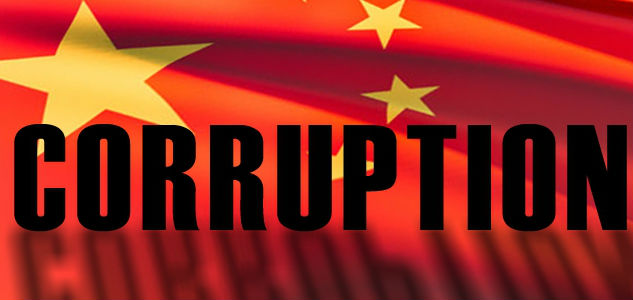Global Times reports that a new wave of anti-corruption crackdowns following the Third Plenum of the 18th CCP Congress has led to the dismissal of high-level SOE and government officials, and has placed others under investigation:
Lin Xiushan, deputy director of the Organization Department of the CPC Heilongjiang Provincial Committee, was removed from his post. Lin was also stripped of his two other positions as Party chief and deputy director of the Heilongjiang Provincial Human Resources and Social Security Bureau, Xinhua reported.
[…] Separately, Li Dongguang, vice president of the Aluminum Corporation of China, the largest nonferrous metals enterprise in China, which is directly supervised by the central government, has resigned from the company due to an ongoing investigation over “personal issues,” the Shanghai Stock Exchange announced Tuesday.
Additionally, Lu Xiangdong, former deputy general manager of State-owned telecommunication giant China Mobile, was sentenced to life in prison on Friday for taking bribes totaling more than 20 million yuan ($3.28 million), caixin.com reported Tuesday.
The Beijing News reported that Xu Mengjia, former Party chief of Ya’an, Sichuan Province, has been put under investigation for corruption by the Sichuan Provincial Commission for Discipline Inspection of the CPC. [Source]
The reform agenda that emerged after the CCP Congress’ Third Plenum last week included, among other measures, moves to deepen the Xi administration’s ongoing crackdown on corruption at all levels of the CCP. The South China Morning Post notes that the reshuffling of former National Audit Office deputy director Hou Kai to the Shanghai Disciplinary Commission signals a move towards a centralization of disciplinary oversight of the Party, as decided at the recent party meeting:
The appointment is significant, according to Zhu Lijia, a professor of public policy at the Chinese Academy of Governance, because it showed the [Central Commission for Discipline Inspection] CCDI had started a restructuring process in line with the party’s recent announcement of a package of reforms following its third plenum meeting, which ended last week.
“His appointment signifies the personnel decision on regional CCDI officials is now determined at the central level, and that could enhance the independence of the disciplinary watchdogs,” Zhu said.
The party announced a series of reform plans after its third plenary session, including a new scheme that empowered the CCDI to oversee the appointment of lower-level disciplinary officials. Traditionally, the agency had little real power over such officials, who are picked by local party committees.
[…] “The anti-graft agency must have a group of independent and powerful officials to crack down on corruption,” [Peking University anti-corruption expert] Zhuang said. “The change was made after the top leadership realised collusion between corrupt officials and regional graft-busters was severe, which slowed their efforts to ensure a clean government.” [Source]
In the lead-up to the reform-focused party meeting, an influential state-run think tank issued the “383 Plan,” a reform proposal which included a pitch for the national rollout of an “honesty annuity” or “integrity bonus” scheme that has already been tested in some municipalities and provinces. The FCPA Blog outlines this controversial proposed measure to curb corruption:
With the honesty annuity system, the government would deposit a proportion of the government official’s salary into a special account, which will be awarded to the official after his retirement if he has a clean career record. The system will be tested on officials in public administration as well as senior executives at state-owned enterprises and newly promoted civil servants.
Under the proposed scheme, civil servants and local governments will deposit funds into a shared “integrity fund” account. Officials can gain access to 70% of their funds every five years and get complete access upon retirement, provided they have a clean record. Any disciplinary violations or corruption will lead to reduction of the fund.
[…] The proposal and pilot programs have sparked some debate. Critics argue the integrity fund fails to curb corruption and appears to be another bonus for civil servants. [Source]
Prior to the Third Plenum, former vice governor of Jilin Tian Xueren was handed a life sentence for corruption. A report from Caijing notes the web of shady SOE transactions uncovered during the investigation into Tian:
Tian was in charge of economic affairs, in particular finance and state-owned assets, when he served as vice governor of Jilin Province. It is during this period that he pushed for the listing of a series of companies, including Jilin Zixin Pharmaceutical Company Limited (Zixin Pharmaceutical).
Guo Chunsheng, former Chairman of Zixin Pharmaceutical, offered a total of US$ 1.78 million, or about 12.17 million yuan, in bribes to Tian from April 2005 to Aug. 2010. In exchange, Tian helped Guo’s company get listed and secure bank loans.
Zixin Pharmaceutical, which landed on the SME Board in March 2007 and raised 160 million yuan, has received constant government policy support ever since. However, the drug maker, embroiled in an insider trading scandal, is currently under an ongoing investigation by the China Securities Regulatory Commission (CSRC). […] [Source]
For more on anti-corruption measures or the recent third plenary session, see prior CDT coverage.








